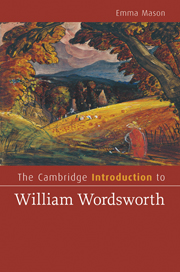Chapter 4 - Works
Published online by Cambridge University Press: 05 June 2012
Summary
Wordsworth's poems are strange. They address the relationship between nature and the self, but are not straightforwardly pastoral or biographical. They conjure shadowy and silent beings who appear from and disappear into rural landscapes, but reject the narrative demands of the Gothic or romance. They sometimes seem facile, leaving them vulnerable to satire and parody, but when looked at again betray an emotional complexity that lures us into political, ethical and moral questions. When Sara Hutchinson claimed to have disliked Wordsworth's poem ‘The Leech-Gatherer’ (1802) (later called ‘Resolution and Independence’), Dorothy replied:
When you happen to be displeased with what you suppose to be the tendency or moral of any poem which William writes, ask yourself whether you have hit upon the real tendency and true moral, and above all never think that he writes for no reason merely because a thing happened – and when you feel any poem of his to be tedious, ask yourself in what spirit it was written – whether merely to tell the tale and be through with it, or to illustrate a particular character or truth.
John Keats similarly recognized the importance of going with the feeling evoked by Wordsworth's poetry rather than attempting to scrutinize or squeeze meaning out of it. He wrote that Wordsworth's skill resided in his capacity to lead us down ‘dark passages. We see not the balance of good and evil; we are in a mist, we are now in that state, we feel the “Burden of the Mystery”.
- Type
- Chapter
- Information
- The Cambridge Introduction to William Wordsworth , pp. 63 - 97Publisher: Cambridge University PressPrint publication year: 2010

